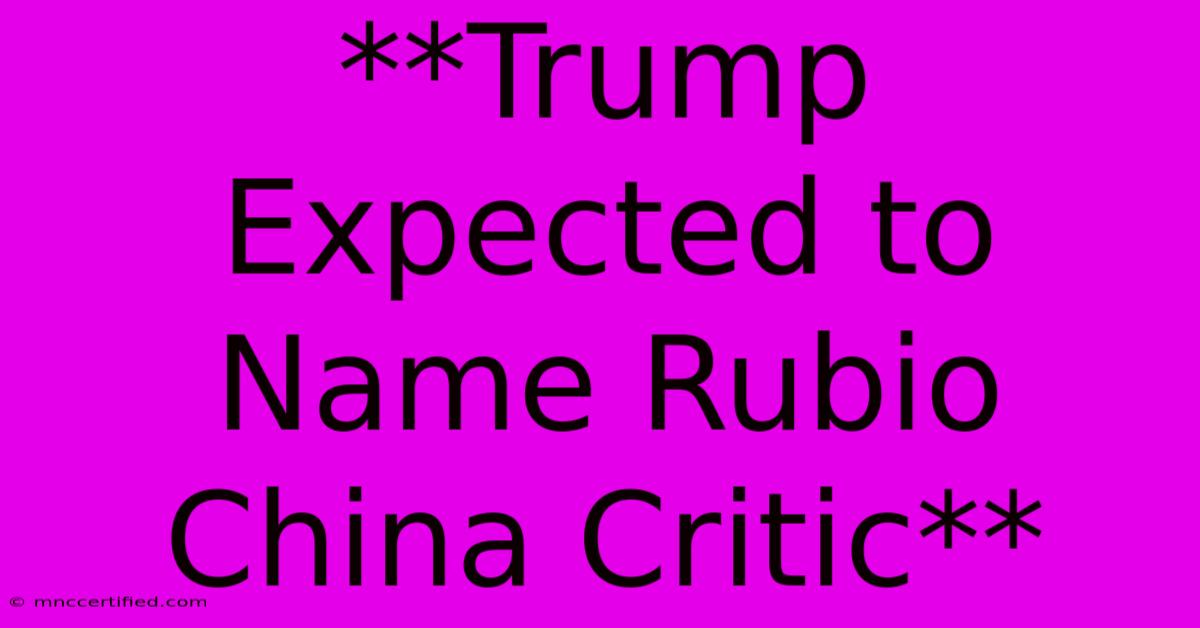**Trump Expected To Name Rubio China Critic**

Table of Contents
Trump Expected to Name Rubio China Critic: Implications for US-China Relations
Former Florida Senator Marco Rubio, a vocal critic of China's policies and a strong advocate for a tough stance against Beijing, is widely expected to be nominated by President Donald Trump as the next U.S. ambassador to China. This potential appointment has sparked considerable interest and speculation about its implications for the already strained relationship between the two superpowers.
Rubio's Stance on China: A History of Tough Talk
Rubio has consistently expressed concerns about China's economic practices, human rights violations, and growing military assertiveness in the South China Sea. He has been a vocal critic of China's trade policies, calling for a stronger response to what he sees as unfair competition. He has also been a staunch supporter of Taiwan and has pushed for increased military support for the island nation.
During his time in the Senate, Rubio was a prominent member of the Senate Foreign Relations Committee, where he often spoke out against China's actions. He has also been a frequent critic of China's treatment of Uyghur Muslims in Xinjiang province and its crackdown on Hong Kong's democracy movement.
Implications for US-China Relations: Increased Tensions or a Chance for Dialogue?
Rubio's appointment could have a significant impact on US-China relations. His known hawkish stance towards China could lead to further tensions and complicate already delicate negotiations on issues like trade, cybersecurity, and human rights. Some analysts believe that his appointment could signal a further hardening of the Trump administration's approach to China, potentially leading to a new Cold War.
However, others argue that Rubio's appointment could also present an opportunity for dialogue and a more constructive relationship. His deep understanding of China's policies and his strong network of international contacts could allow him to navigate complex issues and build bridges between the two countries. Additionally, Rubio's strong ties to the business community could help facilitate trade and economic cooperation between the two economies.
The Larger Context: A Shifting Global Landscape
The US-China relationship has been in a state of flux for several years, marked by growing competition and mistrust. The Trump administration has implemented a range of policies aimed at countering China's influence, including tariffs on Chinese goods, restrictions on technology transfer, and a renewed focus on military power in the Asia-Pacific region.
Rubio's appointment, if confirmed, would come at a time when the global landscape is rapidly shifting. The COVID-19 pandemic has highlighted the interconnectedness of the world, while the rise of China as a global power has presented new challenges and opportunities for the United States.
It remains to be seen how Rubio's appointment will shape the future of US-China relations. His past pronouncements suggest a potentially more confrontational approach, but his diplomatic experience and understanding of China could also lead to a more nuanced and collaborative approach. The coming months will be crucial for observing how the two superpowers navigate their complex relationship and manage the challenges of a changing global order.
Keywords: China, US, Trump, Rubio, Ambassador, Relations, Trade, Security, Taiwan, Human Rights, South China Sea, Diplomacy, Global Landscape, Cold War, COVID-19, Economic Cooperation, Global Power

Thank you for visiting our website wich cover about **Trump Expected To Name Rubio China Critic**. We hope the information provided has been useful to you. Feel free to contact us if you have any questions or need further assistance. See you next time and dont miss to bookmark.
Featured Posts
-
British Mum Reports Intruder At Turkish Hotel
Nov 13, 2024
-
Commercial Truck Insurance Kentucky
Nov 13, 2024
-
Ryan Coogler Writing Black Panther 3 Update
Nov 13, 2024
-
The Valiant Newsletter Facing Lifes Challenges
Nov 13, 2024
-
Pitbull Live In Ireland 2025 Concert Dates
Nov 13, 2024